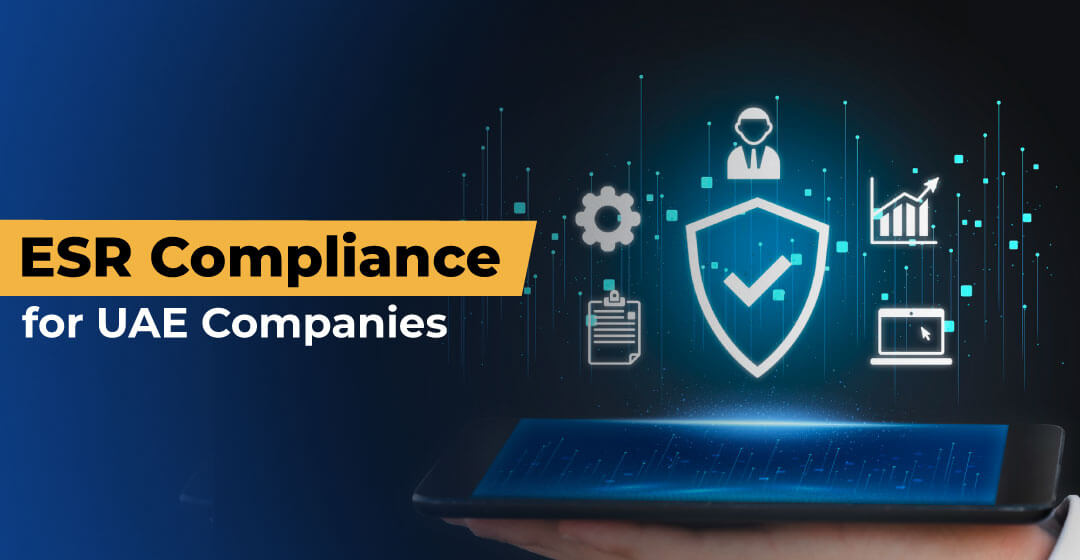In recent years, the UAE has undergone significant regulatory changes to align with international standards on tax transparency and anti-avoidance measures. One such critical development is the Economic Substance Regulations (ESR), which aim to ensure that businesses holding licenses for specific activities in the UAE are genuinely operating within the jurisdiction and not merely taking advantage of the region’s tax benefits.
If you’re a business owner in the UAE, staying ESR-compliant is not just a legal necessity but a vital step in maintaining your business’s credibility. Here’s everything you need to know about ESR compliance.
What is ESR?
Introduced in 2019 and amended in 2020, the Economic Substance Regulations (ESR) require UAE-based entities engaged in certain activities to demonstrate substantial economic activity in the region. This means businesses must meet specific requirements, such as maintaining physical operations, employing qualified staff, and generating income that matches the level of activities conducted in the UAE.
The ESR applies to companies in mainland, free zones, and offshore jurisdictions, provided they fall under the “relevant activities” outlined by the regulations.
Who Needs to Comply?
The ESR is primarily relevant businesses conducting the following relevant activities:
1. Banking
2. Insurance
3. Investment Fund Management
4. Lease-Finance
5. Headquarters
6. Shipping
7. Holding Companies
8. Intellectual Property (IP)
9. Distribution and Service Centers
If your business falls into one or more of these categories, you must assess your compliance requirements.
Key ESR Requirements
To meet the UAE’s economic substance requirements, companies must:
1. Submit an ESR Notification: This must be done annually, even if you do not undertake relevant activities.
2. Conduct an Economic Substance Test: This involves demonstrating adequate staff, expenses, physical assets, and income related to your relevant activities.
3. File an Annual ESR Report: If your business earns income from relevant activities, you must submit a detailed report outlining how you meet the substance requirements.
Check Out: Accounting Services in Dubai
Failure to comply can result in severe penalties, suspension of trade licenses, and reputational damage.
What Was New for 2024?
For 2024, the UAE authorities further streamlined the compliance process to enhance transparency and accountability. Key updates include:
Enhanced Reporting Mechanisms: Businesses must provide additional evidence to prove substance requirements, such as local staffing contracts and financial audits.
Integration with Corporate Tax: With the corporate tax laws now in effect, ESR compliance plays a complementary role in ensuring that companies genuinely contribute to the UAE economy.
Check Out: Corporate Tax Consultancy in Dubai
Targeted Enforcement: Authorities are increasing audits and imposing stricter penalties for non-compliance, emphasizing the importance of accurate reporting.
Steps to Ensure ESR Compliance
1. Assess Your Business Activities
Determine whether your business falls under the relevant activities category. Seek expert advice if you’re uncertain.
2. Prepare Documentation
Maintain detailed records, including financial statements, staff employment contracts, and lease agreements, to prove economic substance.
3. Submit Timely Notifications
File your ESR notifications and reports within the deadlines set by your regulatory authority. Late submissions can lead to hefty fines.
4. Review Your Operations
Ensure your business has the necessary infrastructure, employees, and activities in the UAE to meet substance requirements.
5. Seek Professional Assistance
Navigating ESR compliance can be complex. Working with a consultant can simplify the process and help you avoid costly mistakes.
Why ESR Compliance Matters
Complying with ESR isn’t just about ticking boxes, it’s about building trust. It shows that your business is credible and responsible, which goes a long way in attracting investors, securing partnerships, and thriving in the UAE’s competitive market.
With global attention to tax practices growing, ESR compliance helps your business align with international standards and avoid complications with overseas stakeholders. As the UAE cements its position as a global business hub, meeting ESR requirements has become essential for success. Businesses should see ESR not just as a requirement but as a chance to enhance transparency and drive long-term growth.











 Founder's Podcast
Founder's Podcast 
